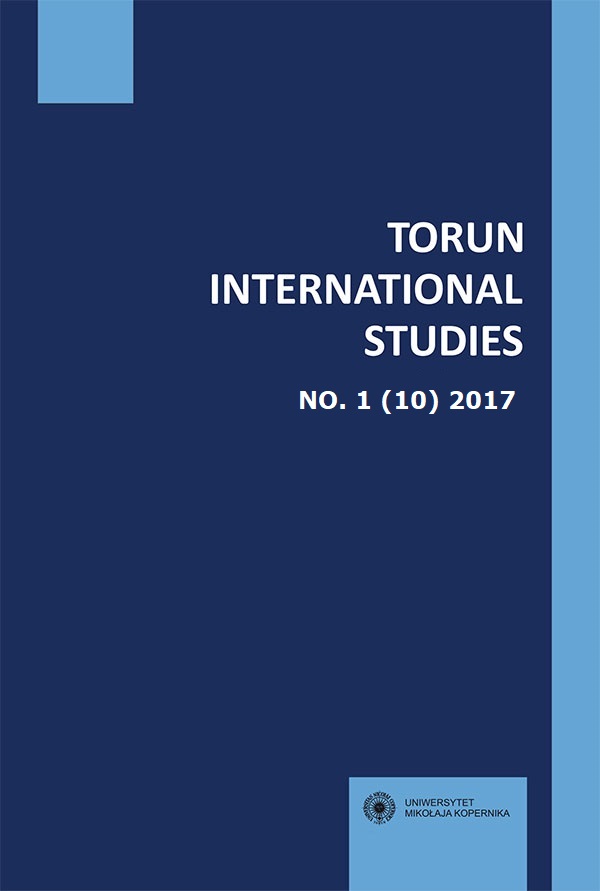DIFFERENT FOCI OF FOREIGN POLICY ANALYSIS IN „FOREIGN AFFAIRS”: RUSSIAN POLICY TOWARDS THE WEST IN 1999͵2013
DOI:
https://doi.org/10.12775/TSM.2017.005Keywords
Russian foreign policy, international relations theories, Foreign Affairs, foreign policy analysisAbstract
Articles in Foreign Affairs have always been an informative collection of opinions, which allowed understanding how the U.S., and especially its intellectuals that comment on international relations, perceive other countries and their foreign policies. Then when an international crisis comes, such as the one in Ukraine in 2014 and the subsequent annexation of Crimea, one wonders if the Western analysts might have predicted such outcome. The article analyzes more than three dozen Foreign Affairs publications from 1999 to 2013 and concludes that the authors held rather close-minded views when it comes to foreign policy analysis. They did not present a holistic standpoint, but tried to answer all questions with only a limited number of tools and foci. It is also concluded that combining the realist, liberal internationalist and constructivist attitudes would have allowed for a more comprehensive analysis of the process of creation of Russian foreign policy.
References
Aron, L. (2013a, March 8). The Putin Doctrine. Russia’s Quest to Rebuild the Soviet State. Retrieved December 23, 2017, from https://www.foreignaffairs.com/articles/russian-federation/2013-03-08/putin-doctrine.
Aron, L. (2013b, August 15). The Russian Pause. How Putin Stalled the Reset. Retrieved December 23, 2017, from https://www.foreignaffairs.com/articles/russian-federation/2013-08-15/russian-pause.
Asmus, R. D. (2008). Europe’s Eastern Promise. Rethinking NATO and EU Enlargement. Foreign Affairs, 87(1), pp. 95-106.
Asmus, R. D., & Rosner, J. D. (2009). Logic, Not Lobbies. Foreign Affairs, 88(3).
Bieleń, S. (Ed.). (2011). Wizerunki międzynarodowe Rosji. Warszawa: Aspra.
Blaney III, H. C. (2008). Russian Handshake. Foreign Affairs, 87(1).
Charap, S., & Petersen, A. (2010, August 20). Reimagining Eurasia. A New „Great Game” Will Not Increase U.S. Influence in Russia’s Backyard. Retrieved December 23, 2017, from https://www.foreignaffairs.com/articles/russia-fsu/2010-08-20/reimagining-eurasia.
Clover, C. (1999). Dreams of the Eurasian Heartland: The Reemergence of Geopolitics. Foreign Affairs, 78(2), pp. 9-13.
Colton, T. J., & McFaul, M. (2001). America’s Real Russian Allies. Foreign Affairs, 80(6), pp. 46-58.
Dmitriev, M., & Treisman, D. (2012). The Other Russia. Discontent Grows in the Hinterlands. Foreign Affairs, 91(5), pp. 59-72.
Gat, A. (2007). The Return of Authoritarian Great Powers. Foreign Affairs, 86(4), pp. 59-69.
Goldman, M. I. (2004). Putin and the Oligarchs. Foreign Affairs, 83(6), pp. 33-44.
Karatnycky, A., & Motyl, A. J. (2009). The Key to Kiev. Ukraine’s Security Means Europe’s Stability. Foreign Affairs, 88(3), pp. 106-120.
King, C. (2008). The Five-Day War. Managing Moscow After the Georgia Crisis. Foreign Affairs, 87(6), pp. 2-11.
Kizenko, N. (2013, October 17). Russia’s Orthodox Awakening. The Fraying of Russia’s Church-State Alliance. Retrieved December 23, 2017, from https://www.foreignaffairs.com/articles/russia-fsu/2013-09-17/russias-orthodox-awakening.
Kuchins, A. C. (2012, March 1). The End of the ‘Reset’. Why Putin’s Re-Election Means Turbulence Ahead. Retrieved December 23, 2017, from https://www.foreignaffairs.com/articles/russia-fsu/2012-03-01/end-reset.
Kupchan, C. A. (2010). NATO’s Final Frontier. Why Russia Should Join the Atlantic Alliance. Foreign Affairs, 89(3), pp. 100-112.
Laqueur, W. (2010). Moscow’s Modernization Dilemma. Is Russia Charting a New Foreign Policy?. Foreign Affairs, 89(6), pp. 153-160.
Larrabee, F. S. (2006). Danger and Opportunity in Eastern Europe. Foreign Affairs, 85(6), pp. 117-131.
Legvold, R. (2001). Russia’s Unformed Foreign Policy. Foreign Affairs, 80(5), pp. 62-75.
Legvold, R. (2009). The Russia File. How to Move Toward a Strategic Partnership. Foreign Affairs, 88(4), pp. 78-93.
Lipman, M., & Petrov, N. (2012, February 9). What the Russian Protests Can – And Can’t – Do. Why Putin’s Grasp on Power Remains Firm. Retrieved December 23, 2017, from https://www.foreignaffairs.com/articles/russian-federation/2012-02-09/what-russian-protests-can-and-cant-do.
Logan, D. (2007). Paths to Modernity. Foreign Affairs, 86(4).
Mankoff, J. (2010, September 7). Changing Course in Moscow. Is Medvedev Serious About a New Vision for Russian Foreign Policy?. Retrieved December 23, 2017, from https://www.foreignaffairs.com/articles/russia-fsu/2010-09-07/changing-course-moscow.
McFaul, M., & Stoner-Weiss, K. (2008). The Myth of the Authoritarian Model. How Putin’s Crackdown Holds Russia Back. Foreign Affairs, 87(1), pp. 68-84.
Mendelson, S. E., & Gerber, T. P. (2006). Failing the Stalin Test. Foreign Affairs, 85(1), pp. 2-8.
Newhouse, J. (2009). Diplomacy, Inc. The Influence of Lobbies on U.S. Foreign Policy. Foreign Affairs, 88(3), pp. 73-92.
Pipes, R. (2004). Flight From Freedom. What Russians Think and Want. Foreign Affairs, 83(3), pp. 9-15.
Roxburgh, A. (2012, March 14). How the Anti-Putin Movement Missed the Point. Letter From Moscow. Retrieved December 23, 2017, from https://www.foreignaffairs.com/articles/russian-federation/2012-03-14/how-anti-putin-movement-missed-point.
Sestanovich, S. (2008). What has Moscow Done? Rebuilding U.S.-Russian Relations. Foreign Affairs, 87(6), pp. 12-28.
Simes, D. K. (2007). Loosing Russia. The Costs of Renewed Confrontation. Foreign Affairs, 86(6), pp. 36-52.
Shleifer, A., & Treisman, D. (2004). A Normal Country. Foreign Affairs, 81(6), pp. 58-72.
Shleifer, A., & Treisman, D. (2011). Why Moscow Says No. A Question of Russian Interests, Not Psychology. Foreign Affairs, 90(1), pp. 122-138.
Simes, D. K. (2009, July 17). An Uncertain Reset. Can the United States and Russia Find a Common Language?. Retrieved December 23, 2017, from https://www.foreignaffairs.com/articles/russia-fsu/2009-07-17/uncertain-reset.
Soldatov, A. (2011, December 9). Vladimir Putin’s Cyber Warriors. The Kremlin’s Ham-handed Effort to Squelch Online Dissent. Retrieved December 23, 2017, from https://www.foreignaffairs.com/articles/russia-fsu/2011-12-09/vladimir-putins-cyber-warriors.
Soldatov, A., & Borogan, I. (2010). Russia’s New Nobility. The Rise of the Security Services in Putin’s Kremlin. Foreign Affairs, 89(5), pp. 80-96.
Stoner-Weiss, K. (2011, December 8). A Warning Shot For Putin. Parliamentary Elections and the Reawakening of Russian Politics. Retrieved December 23, 2017, from https://www.foreignaffairs.com/articles/russia-fsu/2011-12-08/warning-shot-putin.
Treisman, D. (2002). Russia Renewed?. Foreign Affairs, 81(6), pp. 58-72.
Treisman, D. (2013, August 8). The Wrong Way to Punish Putin. How to Pressure Moscow Without Boosting the Kremlin and Alienating Russians. Retrieved December 23, 2017, from https://www.foreignaffairs.com/articles/russian-federation/2013-08-08/wrong-way-punish-putin.
Trenin, D. (2006). Russia Leaves the West. Foreign Affairs, 85(4), pp. 87-96.
Yaffa, J. (2012, March 1). The People vs. Vladimir Putin. The Russian Middle Class Campaigns Against the Kremlin. Retrieved December 23, 2017, from https://www.foreignaffairs.com/articles/russian-federation/2012-03-01/people-vs-vladimir-putin.
Walewicz, P. (2016). Narracje na temat aneksji Krymu na łamach "Foreign Affairs" w świetle teorii stosunków międzynarodowych. Świat Idei i Polityki, 15, pp. 115-138.
Downloads
Published
How to Cite
Issue
Section
Stats
Number of views and downloads: 527
Number of citations: 0



